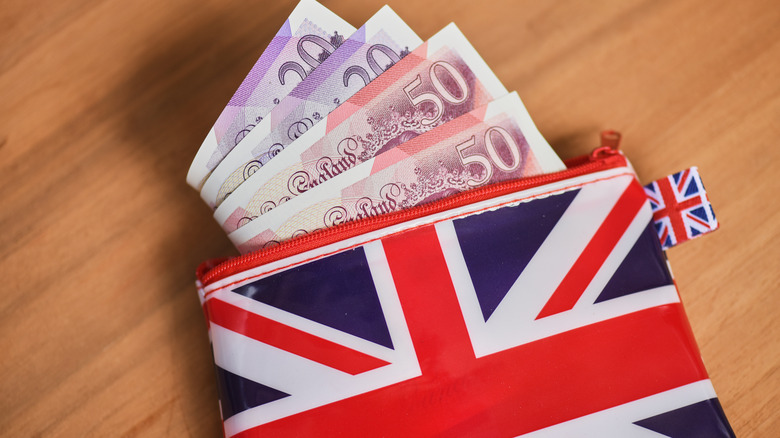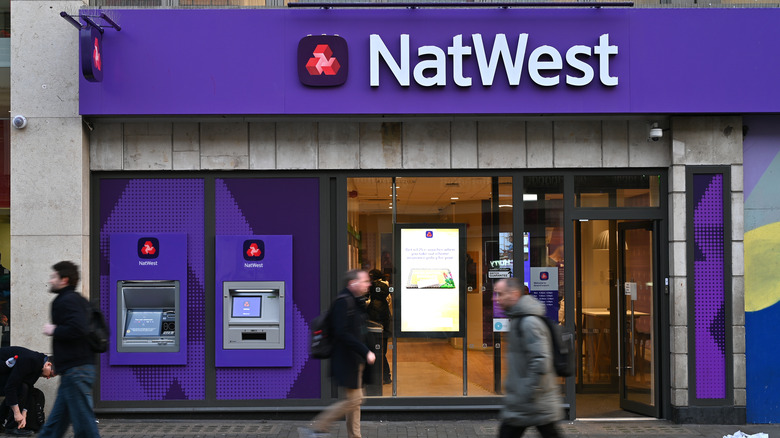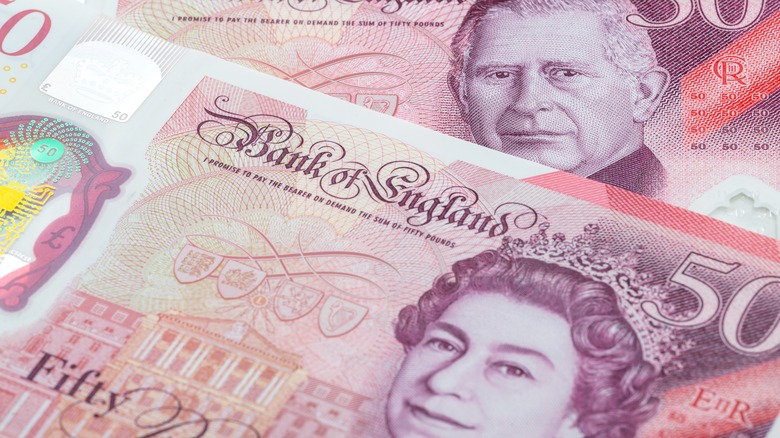Tourists Are Often Oblivious To A Crucial Unspoken Rule About Money In The United Kingdom
For travelers to the United Kingdom, it's perfectly natural to withdraw cash from a bank. To avoid wasting money at the ATM, it only makes sense to take out a decent sum, at least the equivalent of a couple hundred U.S. dollars. When the money is spat out, you will very likely receive a couple of 50-pound notes. To get change — and find yourself with more manageable denominations — you'll probably use one of these notes to pay for something medium-pricey, like a lunch or maybe a gift from a local shop. All of these events are standard and logical, so you'll be surprised when a clerk or waiter tells you, "So sorry, mate, can't accept that one. Haven't you got anything smaller?"
What most foreign travelers don't know is that many U.K. businesses simply refuse to accept 50-pound bills. The bills are fairly rare, of course; each is worth about $65 in the U.S., which is a pretty valuable shred of paper to whip out at a Tesco supermarket. Large bills are also inconvenient for most people who carry cash, since you can't buy anything quick and cheap, like a pack of gum.
But there's another reason many cashiers have a policy against the 50-pounders: There's a long history of counterfeit notes. Many of these false 50s have gone into circulation in U.K. restaurants and retail, ruining till counts and frustrating owners. A renaissance in high-quality printing has made it more difficult than ever to tell the difference between real and fake notes. For money handlers, it's easier just to never deal with them at all.
The U.K.'s struggle with counterfeit cash
In general, counterfeiting is a shockingly large problem in the U.K. Most of this comes in the form of fake name-brand goods, like knock-off footwear and designer T-shirts, but these kinds of facsimiles made up £7.1 billion ($9.3 billion) of retail sales in 2021, according to a study by the Organization for Economic Co-operation and Development. Many would argue that a pair of sweatpants (or "joggers" in British English) with a false Adidas logo pasted to the side isn't the same as printing legal tender and passing it off as actual cash, but both activities are a very real crime: Offenders willfully exchange something they know is worthless, hoping their victims won't realize the truth until it's too late.
The practice is so common that many organizations, such as the Bank of England, offer online tutorials on how to identify counterfeit notes. Understand that faux-50s are fairly rare, and the odds are low that you'll get stuck with one (especially if you're getting one from a bank). But for most of us, $65 is a good amount of money, even in a hyper-expensive city like London, and many merchants refuse to take the risk. The U.K. is hardly alone when it comes to cash-based anxieties: In Japan, this one shopping error could get tourists in hot water, and the U.S. Federal Reserve is engineering new types of cash to prevent recurring flare-ups of counterfeiting, such as the (fake) $300,000 confiscated at John F. Kennedy Airport in New York in November 2024. That quantity of paper can wreak havoc on commerce, especially small businesses that are more likely to handle cash — and don't have much wiggle room in their budgets.
The future of British currency
Cash is evolving in the U.K., just as it is everywhere else, and it's hard to say how long the 50-pound note will even last. The face of King Charles III made its debut on the notes in 2024, commemorating his historic succession. The back of the 50-pound bill honors the late Alan Turing, the engineer who helped crack the Axis' Enigma code during World War II. The new note is polymer-based, with a special "window," a patch of foil, and two holograms. Using a microscope, you can see tiny print, and the number "50" appears under ultraviolet light. In short, this bill would be extremely hard for anyone to recreate, no matter how impressive the printer.
At the same time, Britons are moving away from cash altogether. Experts estimate that cash accounted for half of payments in 2009, but had diminished to only 12% by 2023 (via The Guardian). Between credit cards, COVID, and the growing popularity of digital transactions like Stripe and Apple Pay, cash is no longer necessary or even desirable for many shoppers. London is only one part of the country, but the fast-moving capital has been an early adopter of many widespread technologies, such as 5G telecommunications networks, CCTV security cameras, and the versatile Oyster transport card, and these concepts rapidly filter across the U.K. That said, other payments can be problematic as well. Lost phones and "skimmed" cards have left plenty of travelers in a lurch. Here is travel expert Rick Steves' advice on what common payment method to avoid using while traveling in Europe.


